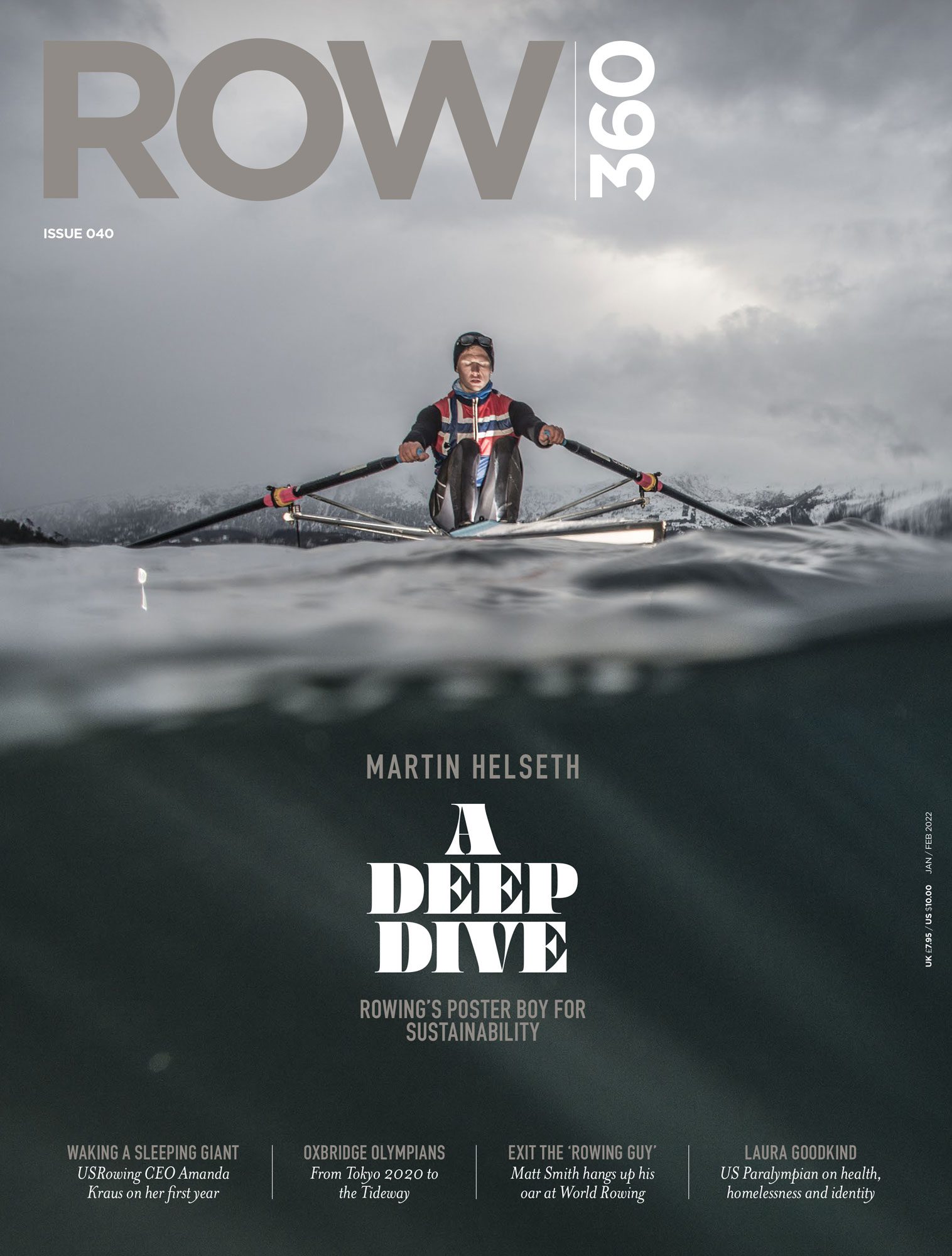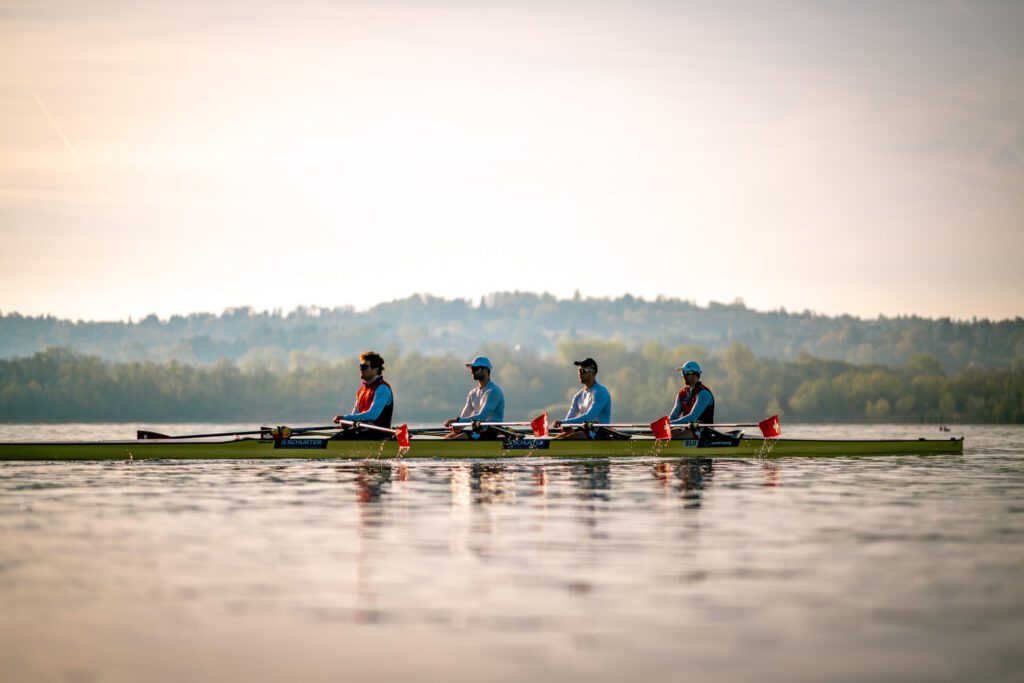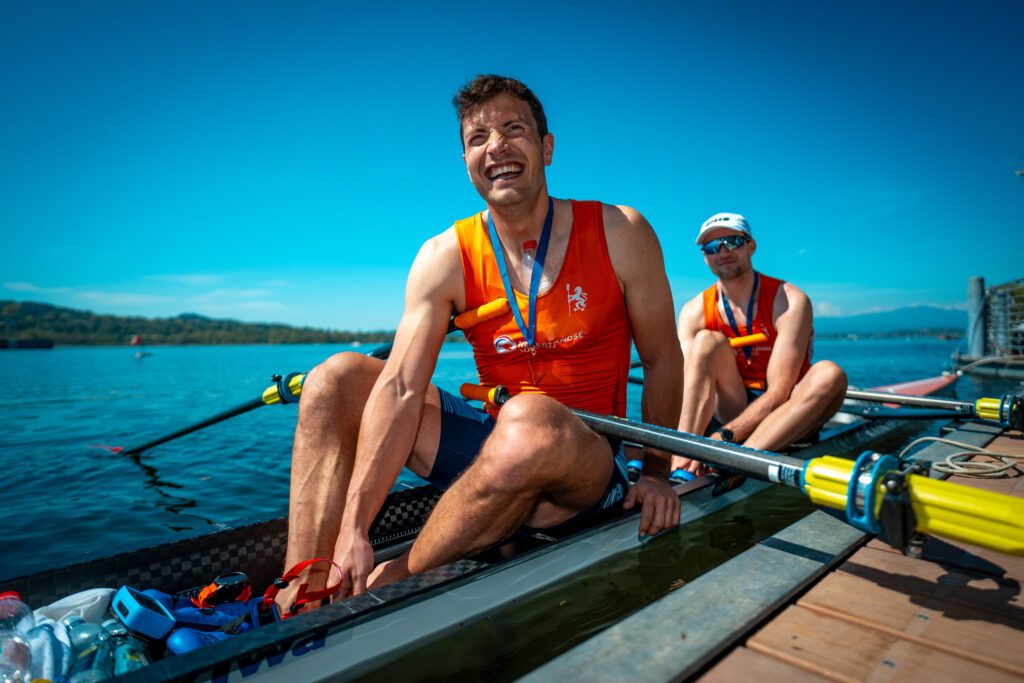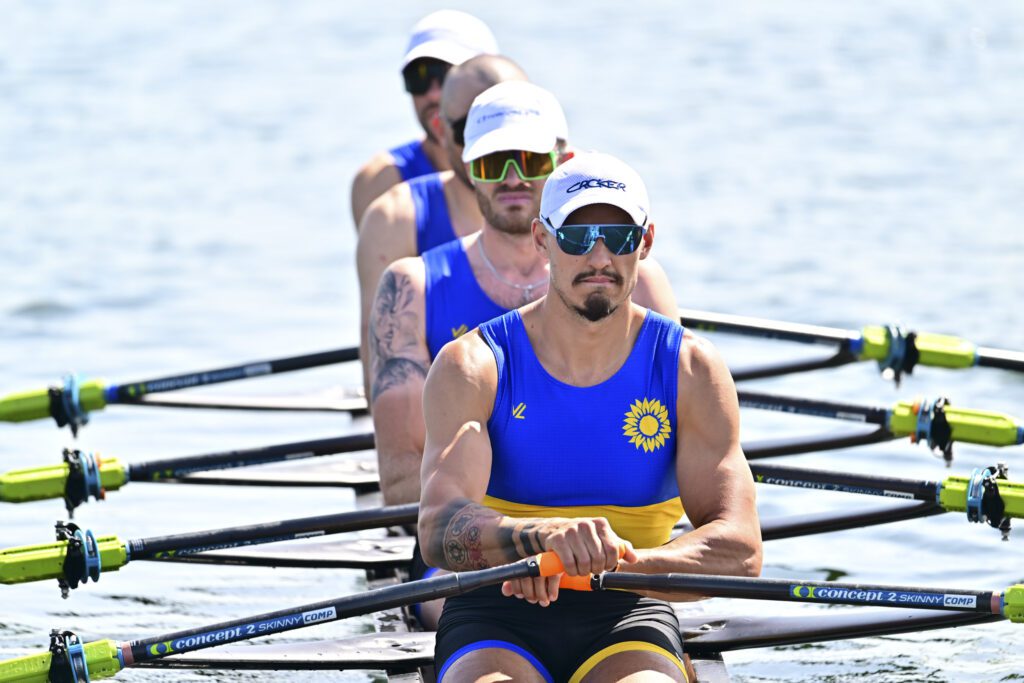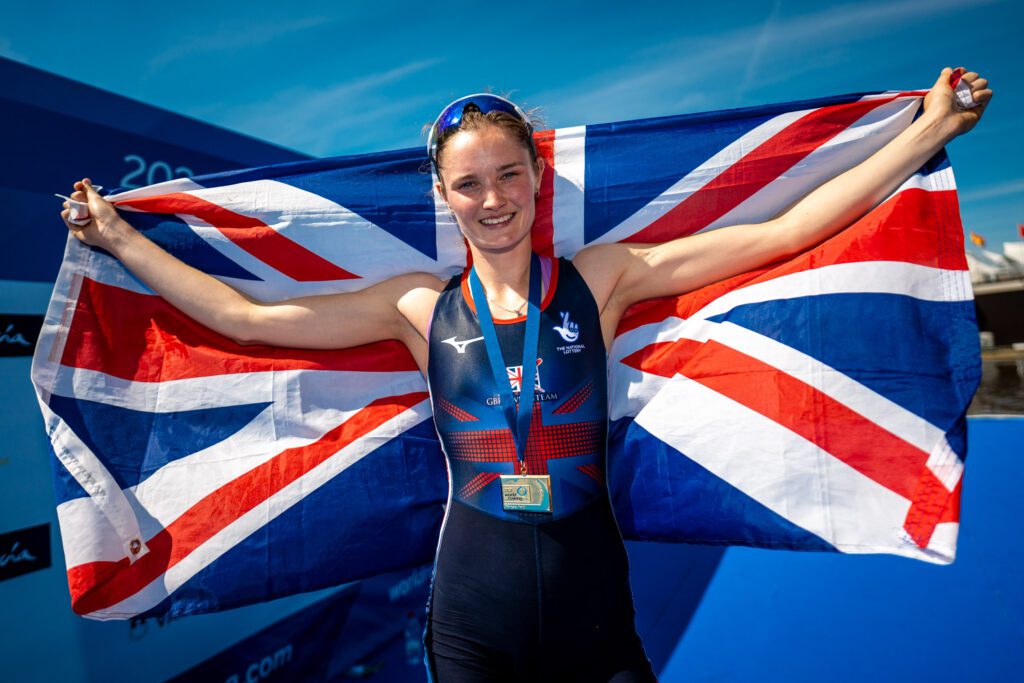Matt Smith was enrolled at the University of California Los Angeles when he went to the Olympics in 1984 as assistant team manager for US Rowing. A tall oarsman studying for an MBA, Smith harboured coaching ambitions, and he grasped the opportunity to rub shoulders with the greats at Lake Casitas, the rowing venue for Los Angeles. Kris Korzeniowski, a Polish coach with the US team, told him to watch a Norwegian named Thor Nilsen. Nilsen was the technical director of Italian rowing and ran a continuous international programme alongside the Italian national squad at the latter’s training centre beside the lake in the tiny Umbrian village of Piediluco.
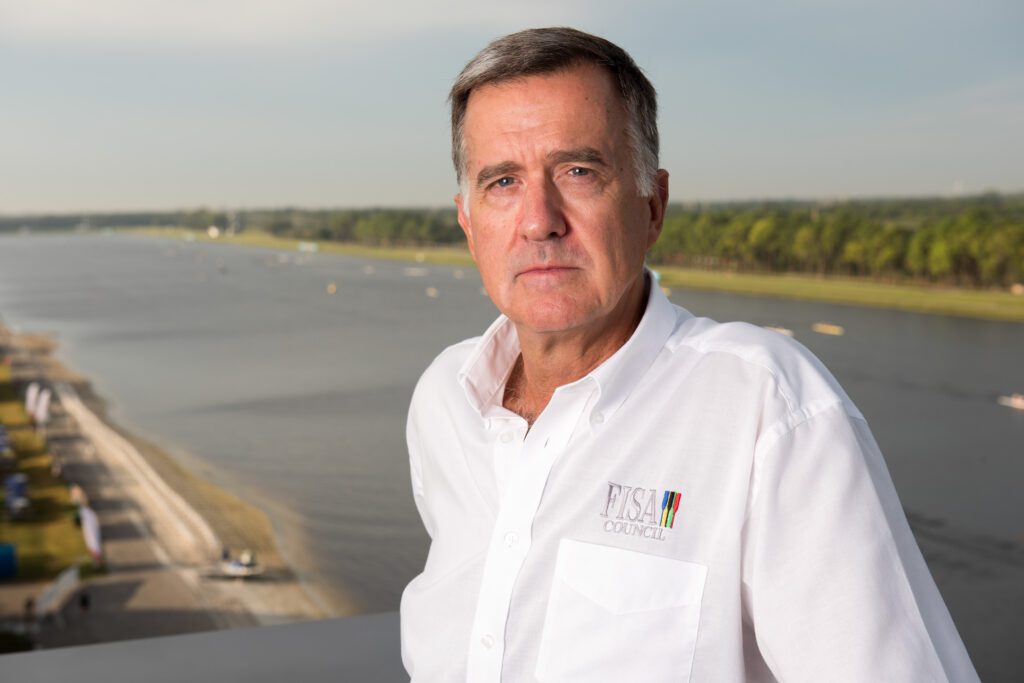
Photo Matt Smith in Florida at the 2017 World Rowing Championships.
Credit Benedict Tufnell
Smith saw Nilsen at a distance, but his first contact came when he happened upon Thor in a Montreal metro station during the lightweight rowing championships later that year. He introduced himself and inquired of opportunities in Italy.
“I AM PROUD THAT WE HAVE KEPT ROWING A SPORT AND NOT A BUSINESS. MANY MEASURE SUCCESS BY THEIR BANK BALANCE, BUT WE MEASURE SUCCESS IN SPORT TERMS.”
Matt Smith
Ever practical, the Norwegian asked if he understood computers, and Smith replied ‘Yes’. Nilsen told him to complete his degree and get in touch a year later. So in January 1986 Smith sold all his stuff and flew to Brussels on People’s Express to be met by Nilsen and his dog Glocky for a two-day drive to Piediluco in a truck towing the boat belonging to the Hansen brothers. He exchanged a life on the busiest intersection in the world for a remote hamlet of sixty inhabitants.
As Nilsen’s assistant, Smith’s first task was to speed-learn Italian, and he was soon involved in editing the draft of the international federation’s coaching manual (Be A Coach), material for which was assembled by twenty of the world’s top coaches whom the Norwegian had engaged for a weekend and confined to rooms at the West German rowing academy in Ratzeburg until they emerged with agreed formulas for their particular specialisms.
World Rowing (then called Fédération Internationale des Sociétés d’Aviron, FISA) was going through interesting times. Thomi Keller, the former oarsman whose chance to row for his country was ruined when Switzerland boycotted the 1956 Olympics because of the Soviet invasion of Hungary, was preparing to retire after holding the tiller since 1958. Early in his presidency, Keller created a powerful umpiring commission and a Code des Courses for racing procedure, and over thirty-odd years he steered FISA’s wily passage through the Cold War, Olympic boycotts and impecuniousness with diplomacy and aplomb.
Keller’s diplomatic instinct led to the appointment of three balanced but virtually power-less vice-presidents – one from West Germany, one from Monaco and one from the Soviet Union. English speakers and West Europeans safely outnumbered those from the wrong, eastern side of the Iron Curtain on FISA’s commissions, and only one commission enjoyed a chairman from East Germany, the ‘country’ at the top of the medal table. Keller avoided excommunicating the South African rowing federation during the years of apartheid boycott by laying down that SA entries for FISA regattas would be refused, while the federation itself, led by the chief executive of Porsch South Africa, got on with opposing ‘separate development’ and promoting rowing in African townships.
Anticipating the International Olympic Committee (IOC) granting East Germany the right to compete under its own flag, Keller stripped FISA’s medal ceremonies of flags and anthems in 1962, declaring that ‘countries do not win regattas’. The Democratic Republic of Germany first competed under its own flag at the women’s European championships in Amsterdam in 1966.
“WE ARE SMALL, SO WE CAN’T AFFORD TO FIGHT EACH OTHER. WE ARE MUCH STRONGER WHEN WE ARE TOGETHER AND FIGHTING AGAINST THE OTHER SPORTS.”
Matt Smith
Keller was also instrumental in creating the General Assembly of International Sports Federations (GAIF) in 1967, an association of summer sports that was soon, intentionally, an irritant to the IOC. The suppliers of sporting entertainment wished for greater representation in the Olympic movement, and among their tabled aims were a one-third slice of the IOC’s huge TV income, a prominent role in the selection of host cities (Mexico City was next in line and its facilities were under question), and a congress for the stakeholders in the movement – national Olympic committees, sports federations and the IOC itself.
Keller’s lifetime of championing athletes and his devotion to the interests of Olympic sports made enemies within the IOC, and ensured that he never filled a Swiss seat there. This was bothersome when he set the direction of FISA’s travel in the late 1980s. He loved amateur rowing’s traditions and roots but recognized that the sport must move on from its cozy gentleman’s club ambience if it was to retain its place in the Olympic programme in the face of newer, more popular sports.
Piecemeal reform happened through the 1980s. FISA defined rowing in these terms: ‘In a rowing boat, all load-bearing parts, including the axes of moveable parts, must be firmly fixed to the body of the boat, but the rower’s seat may move along the axis of the boat.’ The racing distance for women and juniors was extended from 1500 to 2000 metres. What became known as the Cookbook set out procedure for running regattas and necessities of multi-lane rowing course design. Sponsors’ logos were allowed on boats and kit, and the introduction of standard boats was under consideration. FISA moved to new offices in Oberhofen, Switzerland. A secretary general was added to the payroll, and a treasurer joined the executive. Commissions for media and marketing were created, and English joined French as an official language. Bold ideas were banded about.
It was clear that staying in the Olympics was vital for a sport with no revenue stream other than a share of Olympic television rights (income from TV of SF 83,000 overtook that from subs of SF 48,000 in 1972, the year of the Munich Games).
“I CAN TELL YOU THAT EVERY POSSIBLE ALTERNATIVE WAS EXPLORED [FOR SUITABLE WATER FOR THE 2028 OLYMPICS IN LA] BUT SO MANY ARGUMENTS WENT IN FAVOUR OF LONG BEACH AND 1500 METRES.”
Matt Smith
The task facing FISA was five-fold: (1) to increase the number of countries affiliated, (2) to generate entries at regattas from member federations that never sent crews to participate, (3) to increase the number of entries from those that did send entries, (4) to encourage rowing for juniors, under-23s, women, lightweights, masters, indoor rowers and pleasure rowers, and (5) to develop rowing in countries and continents where there was none. The latter involved creating opportunities for lightweights if rowing’s appeal was to register with Africans, Asians and South Americans. Additional aims included affordable boats and equipment and good fellowship. The whole thrust was ‘universality’.
The big question was how to fund such a programme. The IOC found the answer by establishing an Olympic Solidarity fund in 1986 to assist development in sport. Thor Nilsen, the coach who brought Matt Smith to Piediluco, was the architect of FISA’s development, first from his fiefdom at the Spanish rowing centre at Banyoles, Catalonia, in the 1970s, and then as performance director of Italy at Piediluco in the 1980s. At both centres he ran regattas and coaching courses open to all, and in 1986 published the FISA coaching manual.
Nilsen had an aura to match Thomi Keller’s, and when Keller’s loggerheads with IOC president Juan Antonio Samaranch prevented Thomi going cap-in-hand to Olympic Solidarity, Nilsen had no qualms. FISA was granted a large sum, and in 1992 Matt Smith was appointed director of development, while Ricardo Ibarra became FISA’s first development coach with responsibility for South and Central America. Courses in coaching, boat building and repair soon followed.
Soon after Solidarity was oiling FISA’s wheels, tremors beyond FISA’s control rocked the rowing world. On 28 September 1989, when the cheers of the world championships in Bled still echoing round the Karawanks Mountains, Thomi Keller died of a heart attack in Monaco. On 9 November attendees at FISA’s coaching conference watched the Berlin Wall being hacked to pieces on the TV in the Columbia Club, Indianapolis. Keller’s demise came when the plans for his succession were fractious, while the scene in Berlin signalled the demise of the Democratic Republic of Germany and the end of the Cold War. Denis Oswald became president and inherited the drive to modernise FISA, and a clutch of Eastern European professional coaches sought jobs.
Meanwhile, Matt Smith’s role as editor – jointly with the Canadian Ted Daigneault – of Be A Coach stood him in good stead for developing the development programme, and after his appointment in 1992 he was soon seeking opportunities to establish rowing programmes. His first deed was to embark on a whirlwind fact-finding tour that took him to 29 countries between May 1992 and March 1993. Eighteen of these were in Asia, including three former Soviet states, and six of the seven European countries visited were also formerly members of the Soviet Union.i
Matt’s Southeast Asian tour began in Hong Kong with an Olympic Solidarity course. Officials in Hanoi were keen to add other boats to their customary coxed singles. Three nations became members right away. Smith found four boathouses on Inya Lake in Myanmar (formally Burma), where the Brit Professor Eggar had introduced rowing to Yangon University in the 1920s. Three universities and seventeen colleges had boats on the lake.
The former USSR states possessed large well-equipped clubs and informed leaders, but suffered from factors outside their control, such as inflation, unemployment and adverse foreign exchange rates. In Pakistan Smith found that Richard Ayling of the oar makers in Putney, London, was conducting two coaching courses each year for juniors and writing a coach development programme for Pakistan. Smith’s hosts at the Mazoe Dam included an Irishman who kept a crocodile farm.
The pot pourri of fact-finding took its most bizarre turn two years later when Nilsen placed him and Michel Doutre under starter’s orders to conquer Africa. Smith’s first stop was Nairobi, Kenya, to call on the United Nations Development Programme (UNDP) and enquire if they had any money to spare. The answer was ‘no’; rather, said the UNDP, was FISA interested in hooking up to its programme? The answer to that was also negative. But Matt found a sailing and rowing club in Nairobi, and the Kenyan rowing federation was soon founded.
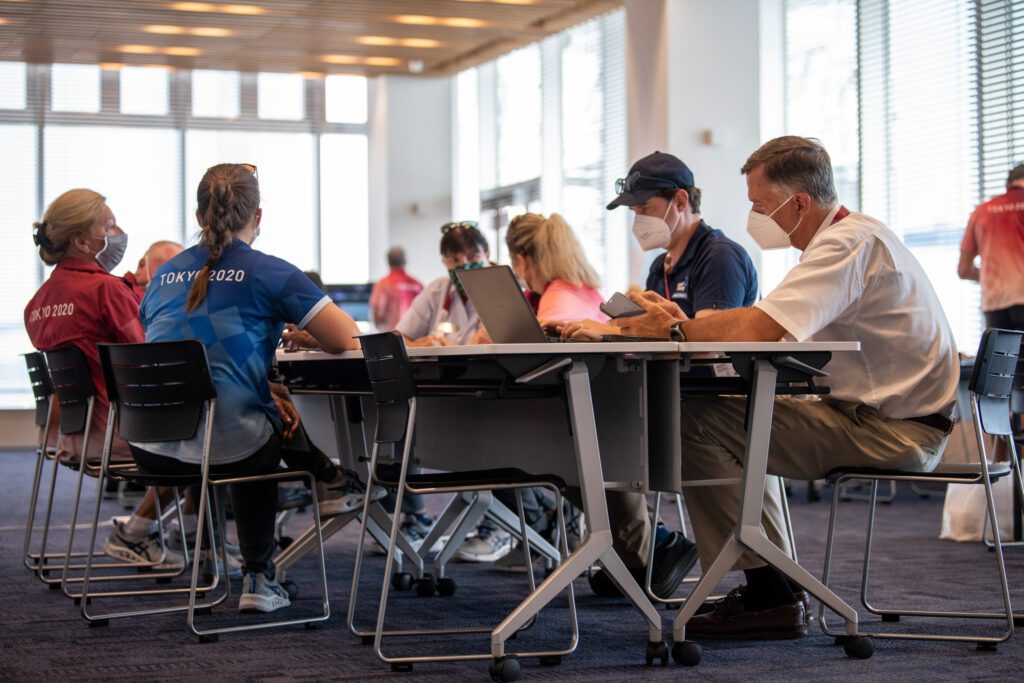
His acquaintance with Africa took him on to Uganda, Zaire (now the Democratic Republic of the Congo), Cameroon and Nigeria. In Lagos, the real adventure began. Every worker at the airport from customs to doorman asked for a ‘tip’. A mass mob of taxi drivers offered their services. Unable to find the meet-and-greet driver promised by the Nigerian Olympic Committee (NOC), Matt asked a police officer for an introduction to an honest cabbie. Which is how FISA’s development ambassador was abducted and lost all his cash. Eventually he was dropped at the Lagos Marriott on the night that the Nigerian soccer stars were celebrating their early bird flight to the US for the FIFA World Cup. Chaos all round. The NOC sent its driver on the following morning, and Matt Smith’s introduction to Africa continued under much better circumstances.
In October 1992 Smith presented a development plan to FISA’s competition commission. It began with impressive statistics: 92 courses had been held in 39 countries involving 3,227 participants since the 1985 extraordinary congress where Claus Hess, FISA vice-president, had headlined the primary importance of educating the coaches of the world.
Smith’s plan identified seven areas to be addressed – qualified coaches and umpires, facilities and equipment, opportunities for competition, scientific and medical support, activities for clubs, schools and federations, and ‘rowing awareness’, a term describing the environment in which the sport takes place. Two themes arose in his assessments of requirements tailored to specific situations – boats, boats and boats, and a holistic approach. It was a waste of time to provide coach education without management technique. ‘A strong, efficient and effective club, school or national rowing federation is a vital pre-requisite for the development of rowing at each level of involvement.’ In other words, nothing could move forward without decent equipment, and development required action on all aspects and at all levels.
Moreover, uniform umpiring is central to running efficient and fair regattas, and they are essential for meeting the programme’s ideal target of regular local, district, regional and national competitions at grass roots and elite levels. Competition and training requires a list of ingredients wanting in many developing countries, beginning with suitable water and boats, oars, gym equipment, weights and a place to store and use them. And vehicles to take boats and their crews to regattas.
“WE HAVE TO GIVE THANKS TO THE CREATORS DICK AND PETER DREISSIGACKER WHOSE INDOOR ROWING MACHINES GAVE HOPE TO SO MANY DURING LOCKDOWN.”
Matt Smith
Targets were set. Education manuals were published in English, French, Spanish, Portuguese and Arabic. FISA aimed to increase its number of member federations to 100 by 1996 and 115 by 2000. Participation in the world championships would be increased to 65 by 1995, 85 by 1999. These goals would be met by assistance with coaching material, courses and camps and supply of second hand boats and boat building courses. Twenty-four countries from Albania to Zambia were identified as targets, and twenty-one dormant members among the 85 member federations could expect a wake-up call.
Finally, the plan set out a year of activity that included fact-finding tours to Central America and four regions of Africa, coaching courses in Ireland, Calcutta (now Kolkata), Singapore, Mexico City, Kuala Lumpur and a dozen in Latin America under Ibarra’s direction, and seminars for former Soviet states and women’s rowing.
Thus Smith’s endeavour made him the ideal candidate to succeed John Boultbee as executive director of FISA in 1995. FISA soon moved to offices near the IOC in Lausanne’s ‘house of sport’. The development programme was at the epicentre of the drive to make rowing more popular and retain its Olympic place. Universality was driven by development, spearheaded by the inclusion of events for lightweights in the Olympic programme. This was achieved for the Atlanta Games in 1996.
Since then, Smith has presided over 25 years of roller-coasting changes in international rowing, including the addition of annual championships for juniors and under-23s, an annual series of world cup regattas for elite rowers, regional qualification regattas and more activities for indoor rowers, masters and pleasure rowers. The Olympic programme now offers equal events for men and women in sculling and rowing. There is a booming Paralympic programme and regular conferences for coaches and medics. More than 150 federations are affiliated to World Rowing, and the members are sending more crews to competitions.
Smith rates the two top achievements of his time as the quality and consistency of World Rowing’s events, and successfully persuading the Paralympic Games to adopt rowing. ‘A number of people started with me back in 1995 on the latter journey,’ he says. ‘It took a lot of time and patience and several trips to the International Paralympic Committee (IPC) headquarters in Bonn to gain the trust and confidence of the IPC, and create a programme that matched their goals and priorities. This was achieved in 2005 for the Games in 2008. My sincere thanks go to former president Phil Craven, former CEO Xavier Gonzales and former sport director David Grevemberg.’
Over the years the development programme has become adept at tailoring boats and rowing to the territory available. The best example is the growth in coastal rowing, popular where sea-going boats such as whalers, pilot gigs and fishing boats abound, and popular in Caribbean and Pacific islands that have nno rivers or lakes but oceans into which to dip their oars.
During his student days at UCLA (University of California, Los Angeles) Matt rowed the rough offshore water between Catalina Island and Los Angeles that typically takes over five hours. This experience informed his understanding of the potential and the limitations of running viable coastal championships. The turning point was World Rowing’s coastal champs in Bari, Italy, in 2007. World Rowing is now committed to persuading the IOC to adopt coastal rowing into the Olympic programme on the grounds that the discipline will attract large audiences and bring action closer to spectators. Guin Batten, who chairs the World Rowing commission that promotes coastal, says that Matt’s creativity and leadership has been huge in encouraging innovation.
Whether coastal rowing will enter the Olympics in 2028 after trying out in 2024 remains to be seen. The irony of the coastal campaign, however, is that World Rowing has ditched Olympic events for lightweights in order to meet the IOC’s insistence on equal events for men and women and its bar on increasing the maximum number of competitors. The lights have been kicked out of the Olympic games for the same cause as they were welcomed at the Games in 1996.
Like Thomi Keller before him who ruled FISA from hotel rooms with the support of his dog, his dog walker and his PA, so Matt Smith is constantly on the move, charged with carrying out the wishes of the congress, council and executive. If you wonder why he has never moved on to other pastures, the answer lies in the nature of rowing and its family. ‘Our federation is a different animal in the panoply of international sports federations,’ Smith says. ‘Our people are motivated to help rowers and rowing. We simply have not allowed personal interests or commercial interests to influence our decisions.’
He derived great pleasure from engaging the team in delivering events. ‘We have a great atmosphere in the organisation, respectful and friendly, even during difficult periods. I tried my best to make people comfortable, to communicate on a first name basis and keep the “family” atmosphere at World Rowing. We are small, so we can’t afford to fight each other. We are much stronger when we are together and fighting against the other sports.
‘I have been extremely lucky to have had great colleagues all along the way. I hesitate to list names as I will surely miss someone who deserves to be mentioned, but these three would be at the top of such a list: Thor Nilsen who first hired me for Piediluco, Denis Oswald who first hired me for FISA and Mike Sweeney, former chair of the regattas commission, with whom I worked closely for many years. I owe these gentlemen a lot for their great support, advice and trust.’
Sheila Stephen-Despans who followed him as director of development at World Rowing says that ‘Matt always wanted to be sure we understood that we at were a team. We supported one another to be our best and to be there when things did not go smoothly. Matt taught us to consider all aspects of a situation and to understand where different stakeholders were coming from and why…he is a person who really brings his humanity and team mindset to every situation…’
His secret, she says, is calmness in the face of chaos. ‘I have always appreciated how, when everything seemed to be getting wild – ugly weather coming in at Rio Olympics and many other weather-related situations that can so impact a regatta, he would calmly gather information from the fairness committee, consult with teams, weather forecasters and organizers, assess the best and safest course of action for athletes and move us forward. Such an approach may seem second nature, but I can safely say that with people coming at you from all directions with different ideas and concerns, the ability to steer through with a calm head is truly to be admired!’
The rowing community owes Matt Smith a huge debt when he leaves World Rowing in good shape. But that is not to deny that a stack of challenges await Vincent Gaillard when he sits in Matt’s chair on 1 January. After an exhaustive search for a suitable course when used for the 2028 Olympic regatta, World Rowing endorsed the water at Long Beach last month [NOV 2021 – the course that was lined with nodding donkeys and open to the ocean when used in 1932. The rowing distance will be 1500 metres – 500 short of the normal 2000 specified for international regattas. The shorter distance will alter training regimes, tactics and the outlook beyond 2028.
World Rowing would do well to cast an eye on what is happening in the United States, where student programmes are the backbone of rowing. Universities and colleges are competing to cut ‘Olympic sports’ in favour of fistfuls of dollars being diverted to already bloated football and basketball budgets. The independent Rowing magazine devoted the whole of its November edition to Gilbert M Gaul’s investigation entitled ‘The End of Sports’. Gaul, a Pulitzer prize-winning investigative reporter, spells out the catastrophe being fought on campuses over the last eighteen months, partly brought about by covid.
The ‘end of sports’ works in three ways, says the magazine in an editorial: the end of teams and sports for many college athletes; the end of the Olympic model of athlete participation; and the end, or purpose, of college sports, the overarching question raised by Gil’s inquiry.
‘Rowing is esteemed, rightly, because it builds and tests character’, Rowing says.
‘Moreover, the apt title of Gaul’s story begs the question ‘is rowing about TV contracts and entertainment? Or is it about teaching student-athletes the lifelong lessons of discipline, teamwork, camaraderie, competition, physical activity and devotion to a goal?’
Smith has had his fill of challenges, not of his own making. The worst has been the whole covid saga that began as a blind man picking up jelly and tore up the events programme. Discussing cancelations and their financial consequences and emotional disappointment with organising committees is very awkward, Smith says. ‘Then came the attempts to influence decisions by individuals who would post opinions on our decisions based on their personal situations.’
A close second in the worst challenges stakes were the Russian doping scandals of 2007 and 2016 that led to reconstructing the Russian rowing federation and the wrecking of its entry to the Athens and Rio games. They also generated a large number of unfriendly messages, some of which were quite personal, Smith says.
At the end of his time in Lausanne Smith acknowledges that there are many challenges ahead for rowing, sports and society as we wait to see the post-covid landscape. But he prefers to concentrate on positives orchestrated during his time at World Rowing. His list includes the amazing rise of indoor rowing and the possible Olympic inclusion of coastal rowing. ‘We have to give thanks to the creators Dick and Peter Dreissigacker whose invention of indoor rowing machines gave hope to so many during lockdown,’ Smith says.
He will, of course, be in evidence behind the scenes for the next twelve months to support President Jean-Christophe Rolland and smooth Vincent Gaillard’s passage into World Rowing. And having been the ‘rowing guy’ for thirty years, he will be looking at projects outside the sport where his experience will add value and perspective.
Matt is also looking forward to more time for hobbies. Before rowing and economics bugged him, the teenager was on course to be a professional musician, studying music and playing the tuba in orchestras and bands. But in 1992 he sold his instrument (bought for $1700 in 1974 and sold for $3000). Then in 2011 he chanced to find out that his tuba had been made in Munich. He paid a visit and bought three! One is in Lausanne, and early birds at the World Rowing office must endure an hour’s tuba practise every morning from 6.30.
Matt is also a ‘film-noir’ fan and has a stack of books to read once he’s done his daily stint on his Watt Bike. ‘I will be living in Rome with my wife and son, enjoying sunshine, good food and delicious beverages,’ he says.
We’ll see you on the towpath, Matt. Or perhaps on the tuba in a marching band!
This article first appeared in
